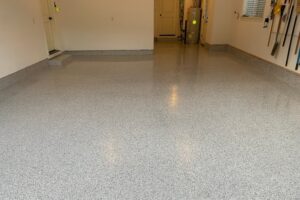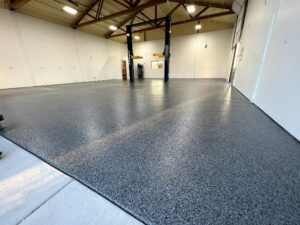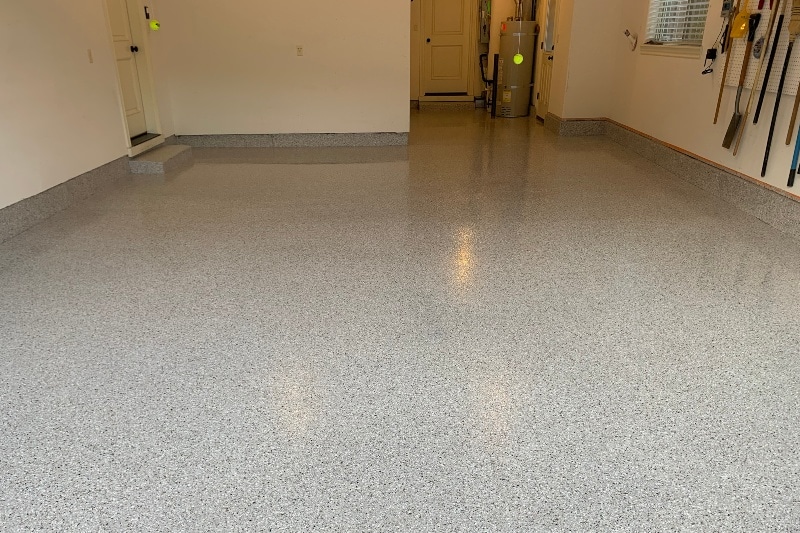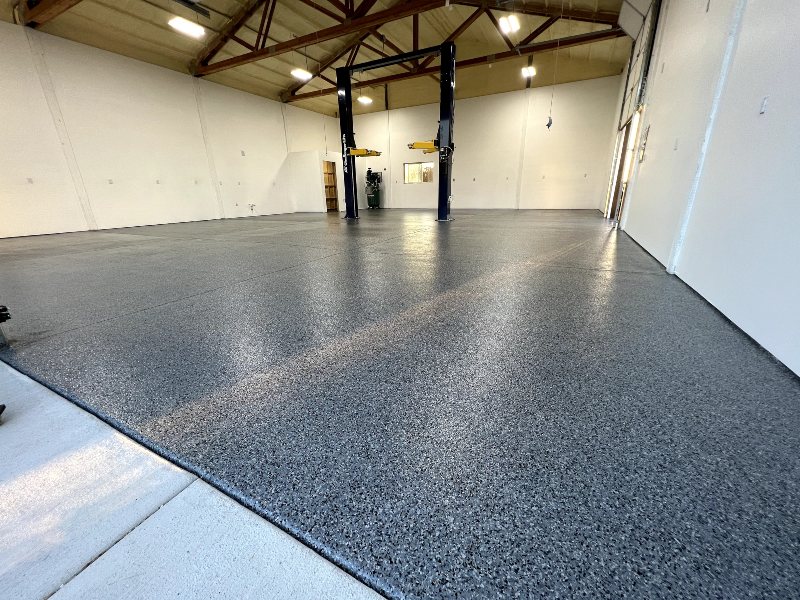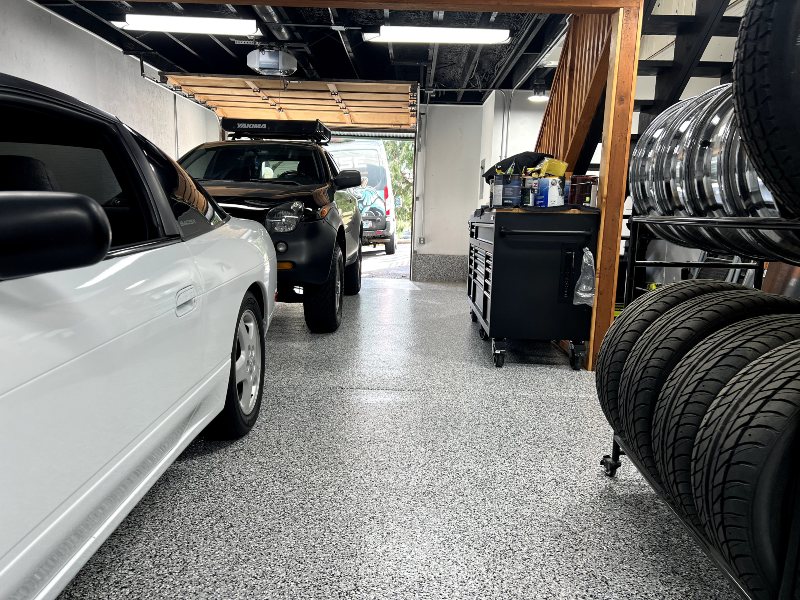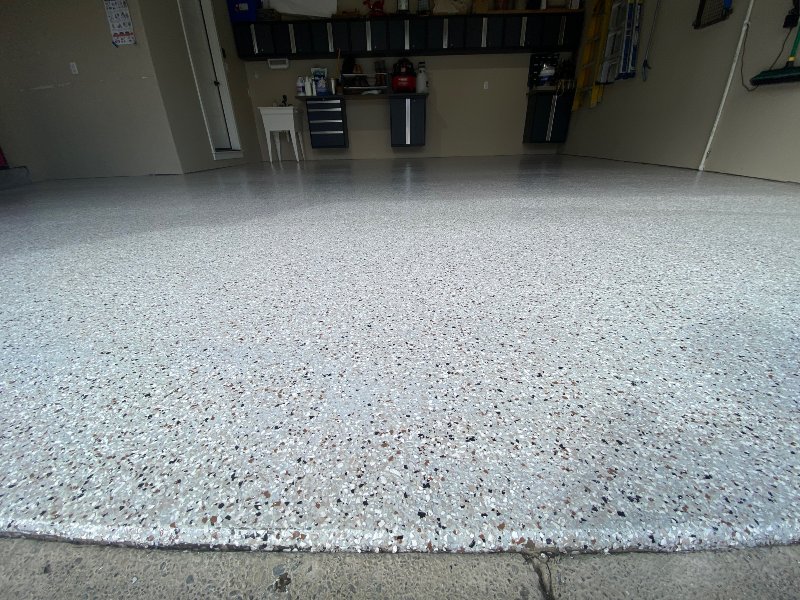Choosing the Best Garage Floor Coating: A Comprehensive Guide
Are you tired of looking at your dull, cracked garage floor? Do you want to revamp and protect this essential part of your home? If so, then you have come to the right place. Selecting the best garage floor coating can be a daunting task with so many options available in the market. From epoxy coatings to polyurethane sealers, it can feel overwhelming trying to determine which one will best suit your needs and budget. But fear not, as we have created a comprehensive guide that will help make this decision easier for you. In this blog post, we will take an in-depth look at various types of garage floor coatings and provide useful tips on how to choose the perfect one for your specific requirements. So whether you use your garage as a workshop or simply for parking cars, keep reading to learn everything you need to know about selecting the best garage floor coating.
The Importance of Garage Floor Coating and Its Impact on Home Value
A high-quality garage floor coating is not merely a matter of aesthetics; it plays a crucial role in determining the lifespan and functionality of your garage. By providing a durable and protective layer, it effectively shields the floor from unsightly stains, unsightly splits, and the inevitable wear and tear that occurs from daily use. As a result, the coating significantly prolongs the overall durability of your garage floor.
Moreover, investing in a well-maintained garage floor goes beyond functional benefits. It adds an extra touch of appeal to your home’s overall aesthetic, contributing to its market value. When potential buyers see a neat and well-kept garage, it signals that the entire property has been meticulously cared for, which can make your home more attractive in the competitive real estate market.
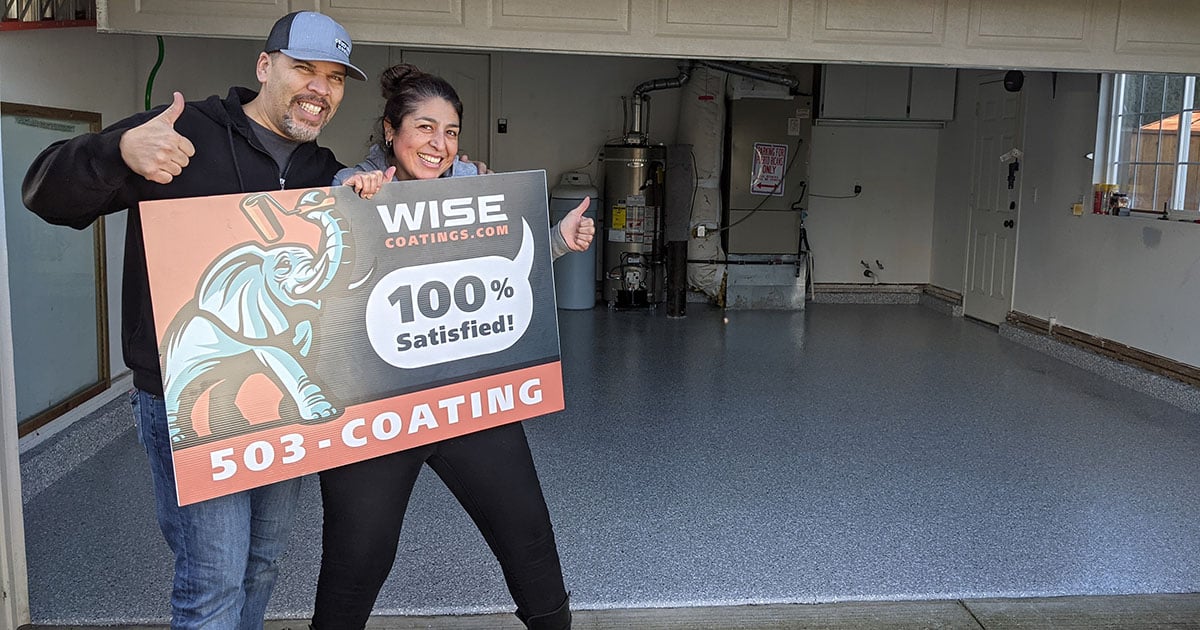
Therefore, choosing the right garage floor coating is not just about enhancing the look and longevity of your garage; it’s also a smart investment that can increase the resale value of your home. With its long-term benefits and potential return on investment, it’s a wise decision that pays off in the long run.
Types of Garage Floor Coatings and Their Benefits
There are several types of garage floor coatings available, each offering distinctive benefits.
Epoxy Coatings
Epoxy coatings are incredibly popular due to their durability, versatility, and affordability. They consist of a two-part mixture of resin and hardener which, when combined, creates a highly resistant surface. Epoxy coatings are known to withstand heavy traffic, resist oil and chemical spills, and are easy to clean and maintain. Additionally, epoxy offers a wide range of colors and decorative options, allowing homeowners to customize their garage floor appearance.
Polyurethane Coatings
Polyurethane coatings provide a high-gloss finish known for its superior resistance to chemicals, abrasions, and UV rays. Though often compared to epoxy, polyurethane is more flexible, which makes it more resistant to scratches and similar damage. Also, while installation is more complex than epoxy, the outcome is a thinner but harder coating that provides excellent durability.
Acrylic Sealers
Acrylic sealers are an economical choice for those in need of quick and simple application. While not as tough as epoxy or polyurethane, they offer decent protection against water, mildew, and UV rays. Acrylic sealers are available in various sheen levels from matte to high-gloss and can be easily recoated when necessary.
Polyaspartic Coatings
Polyaspartic coatings are a newer addition in the world of garage floor coatings. They’re similar to polyurethane in terms of durability but boast a much faster curing time. This makes polyaspartic coatings an ideal choice for those who need their garage back in service in less than a day. However, this comes at a price, as polyaspartic coatings are typically more expensive than other options.
In conclusion, each type of garage floor coating has its own set of benefits and drawbacks. Therefore, when selecting the perfect one, it’s essential to consider your specific needs, budget, and how you plan to use your garage.
Factors to Consider Before Choosing a Garage Floor Coating
When selecting the appropriate garage floor coating, there are several aspects to consider:
- Usage of the Garage: The way you use your garage will greatly influence the type of floor coating you need. For example, if your garage sees heavy-duty use or frequent exposure to chemicals, a durable epoxy or polyurethane coating would be ideal. Alternatively, for lighter use, an acrylic sealer might be sufficient.
- Climate Conditions: Weather can affect the performance of the coating. If you live in a humid or wet climate, you’ll want a coating capable of withstanding moisture. In regions with high UV exposure, a UV-resistant coating like polyurethane or polyaspartic is advisable.
- Aesthetic Preference: Garage floor coatings come in an array of colors and finishes. Consider a coating that matches your aesthetic taste and enhances the overall look of your garage.
- Budget: The cost of coating can vary significantly depending on the type. Understand the cost breakdown, including material and installation costs. Remember, while premium coatings may initially cost more, they could save money in the long run due to their durability.
- Maintenance: Some coatings require minimal maintenance, while others might need regular reapplication. Consider your willingness and ability to perform any necessary upkeep.
- Installation Time: Coatings also vary in their curing time. If you need a fast application and curing process, polyaspartic might be the best choice, despite being a more expensive option.
Remember, the best garage floor coating for you is the one that suits your specific needs and circumstances. Considering these factors will help you make the most informed decision.
Cost Comparison Between Different Types of Coatings and Their Durability
When comparing the costs of various garage floor coatings, it’s crucial to consider not only the initial price but also their durability and maintenance needs. Here’s a rough guide:
- Epoxy Coatings: Relatively affordable, epoxy coatings typically cost between some dollars per square foot, including professional installation. Its strong durability and resistance to heavy wear and tear make it a cost-effective option in the long run.
- Polyurethane Coatings: Slightly pricier, polyurethane coatings may range from four to eight dollars per square foot with professional installation. Given its superior resistance to chemicals, abrasions, and UV rays, it’s a worthy investment for garages exposed to harsh conditions.
- Acrylic Sealers: The most economical option, acrylic sealers cost approximately less than ten dollars per square foot, including installation. While not as durable as epoxy or polyurethane, it offers decent protection and can be recoated when necessary.
- Polyaspartic Coatings: This is the most expensive option, often costing higher than ten dollars per square foot with professional installation. Polyaspartic coatings justify their price with rapid curing time and high durability, similar to polyurethane.
Remember, these are ballpark figures, and actual costs can vary based on your area, garage size, and the specific product chosen. It’s also vital to consider the life span of each coating relative to its cost. For instance, a pricier, more durable coating might prove more cost-effective over time than a cheaper, less resistant one requiring frequent reapplications.
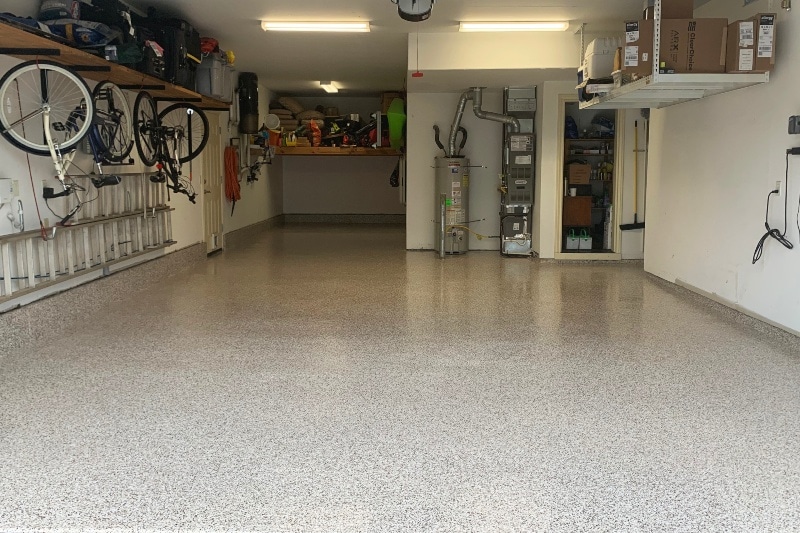
How to Apply Garage Floor Coating: A Step-by-Step Guide
- Prepare the Garage Floor: The first step is preparing your garage floor for the coating. Start by cleaning the floor thoroughly, removing any dust, grease, or oil stains. This step is crucial as it ensures the coating adheres properly to the surface.
- Repair Cracks and Chips: Inspect the floor for any cracks or chips. If present, use a concrete patch product to repair them. Allow the repaired areas to dry completely before proceeding.
- Etch the Floor: Etching is a process that opens up the pores of the concrete, allowing the coating to penetrate deeper and adhere better. You can use a commercial etching product for this purpose. Follow the manufacturer’s instructions carefully.
- Apply the Primer (If Necessary): Some types of coatings, like epoxy, require a primer. The primer should be spread evenly across the floor using a roller.
- Apply the Coating: Once the primer is dry (if used), you can apply the chosen garage floor coating. Again, use a roller for an even application. Start from a corner and work your way out of the garage.
- Let it Cure: After application, allow the coating to cure. The curing time varies depending on the type of coating used. Avoid walking or driving over the surface during this time.
- Apply a Second Coat (If Necessary): Depending on the type of coating and the desired finish, a second coat may be necessary. If so, apply the second coat after the first one has completely cured.
Remember to always follow the manufacturer’s instructions when using any coating product. Proper application is key to ensuring the longevity and durability of your garage floor coating.


